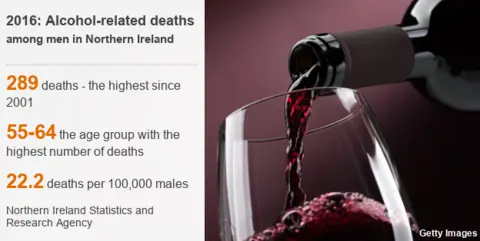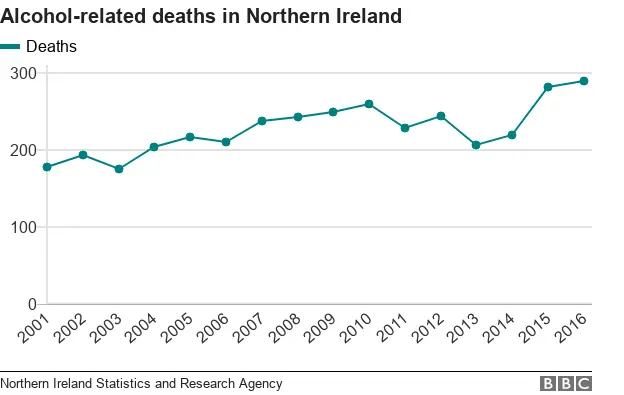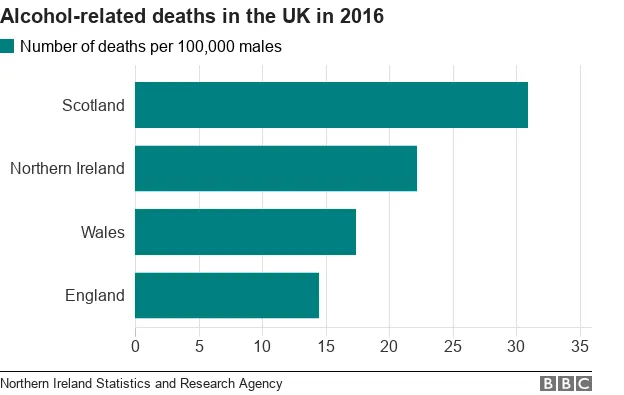Alcohol misuse 'biggest health problem in Northern Ireland'
Alcohol misuse is the "greatest healthcare problem facing Northern Ireland", a coroner has said.
Figures obtained by BBC News NI show the number of alcohol-related deaths in Northern Ireland is the highest on record.
Between 2001 and 2016, more than 3,500 deaths in Northern Ireland were attributed to alcohol.
Coroner Joe McCrisken said: "We have an enormous problem with alcohol use, misuse and abuse in Northern Ireland."
"The figures are frightening because they show that the number of alcohol-related deaths is increasing, so it's important to raise awareness about the dangers," he added.

Dealing with alcohol-related illnesses costs the health service about £250m a year, said Dr George O'Neill, the chairman of Addiction NI.
He added that 12,000 people were admitted to hospital each year with alcohol-related problems in Northern Ireland, where 170,000 people drank hazardously and 47,000 drank harmfully.
Highest on record

But from 2006 to 2016 there were over 1,500 more alcohol related-deaths (2,668) in Northern Ireland than deaths connected to drugs (1,149).
Mr McCrisken said: "I've spoken before about how worrying the drug-death statistics are in Northern Ireland, but alcohol deaths dwarf those figures in terms of the sheer numbers."
He said that while the statistics were shocking, "they probably underplay the scale of the problem".

"These figures are only the tip of the iceberg because these are only deaths where alcohol can be directly attributed," he said.
"The statistics don't include cases where alcohol was involved but may not be noted on the post-mortem report such as car accidents caused by drink driving, or a range of conditions such as heart attacks and strokes that can also be caused by chronic alcohol use."
The figures were provided to BBC News NI by the Northern Ireland Statistics and Research Agency (Nisra).

'Spiralling out of control' - Michael's Story

Michael Bailey lost his job, his family and eventually ended up homeless as a result of alcohol abuse. After a four-year recovery, he now works for Addiction NI.
"I was a daily drinker, from the age of 17 until I was 38, I could have counted the number of days on one hand that I didn't use alcohol. I couldn't sleep without it.
"My life looked perfect; two nice cars outside a detached four-bedroom house with a family and a good job, but inside my head was melting. My abuse of alcohol led to me losing all of it.
"I was homeless for two years and sleeping rough for seven months. Day-to-day I was stealing alcohol from supermarkets and surviving on packets of ham. It was pretty bleak.
"You're caught in that place where you wanted to die but you didn't have the guts to do it, although I did attempt it a number of times. But they were also cries for help. My life was spiralling out of control.
"One Sunday, I woke up in a park and it was a light bulb moment. I thought: 'There has to be more to life than this'.
"I enrolled in a 12-week rehabilitation programme and it was the first time I was alcohol-free for years. That was the start of the road to recovery.
"Thanks to help with counselling and organisations like Addiction NI, I haven't looked back. Whenever I went to rehab I was eight stone and yellow. This year I ran the Belfast marathon."

Mr McCrisken is to hold preliminary inquest hearings into five recent alcohol-related deaths at one sitting on Wednesday to try to raise awareness of the issue.
He said there was a challenge in trying to educate the public about the dangers of alcohol, but that the government also has a role to play.
"The Scottish government appreciated they had a big problem with alcohol deaths and because they have a functioning devolved government they have taken steps to address that," he said.
"They have increased the alcohol price per unit. That means if somebody has £10 in their pocket and they can buy two bottles of wine, if you increase the price so they can only buy one, you've literally cut that person's alcohol consumption in half for that evening."
He added: "Alcohol in Northern Ireland today has never been cheaper, more widely available and with more choice than ever before. It doesn't take a mathematician to work out that we have an even bigger problem coming down the line.
"As a coroner, I know I'm going to be dealing with the issue of alcohol deaths for the rest of my career."
New definition
The Department of Health said the alcohol-related death statistics "should serve as a stark reminder of the tragic impact alcohol misuse has on individuals, families and communities across Northern Ireland.
"There is a range of services in place that can help and support anyone who thinks they might have an issue with alcohol and/or their families - you can see the services available in your area here," said a spokesperson.
In 2016, the UK adopted a new definition of alcohol-specific deaths to be used by the government and the devolved administrations.
The new definition includes all deaths known to be caused exclusively by alcohol, and excludes all deaths from conditions which are only partly attributable to alcohol.
Nisra figures, based on the new definition, are only available for the period 2001 to 2016, with 2016 being the highest on record since reporting began.
Figures for 2017 are not released until later in 2018.
